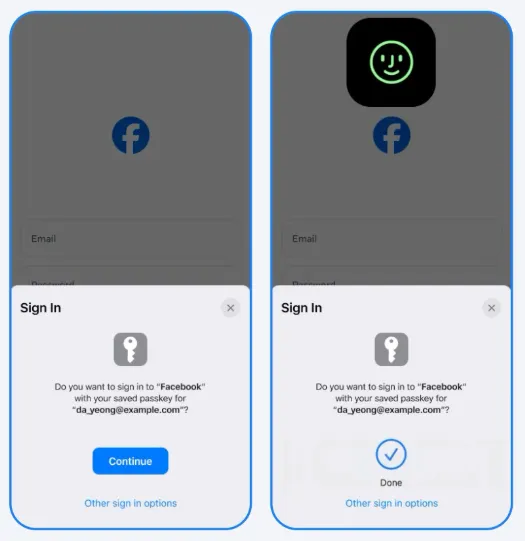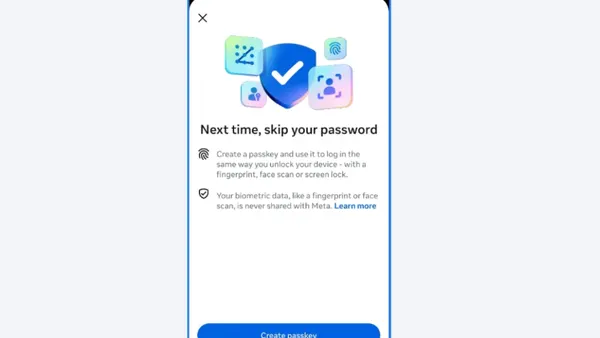In a move to bolster user privacy and account protection, Facebook introduces Passkey access, offering a more secure and seamless login alternative to traditional passwords. This step aligns Facebook with broader industry standards prioritizing biometric authentication and cryptographic security methods.
What Are Passkeys and Why Do They Matter?
Passkeys are a modern authentication method that eliminates the need for conventional passwords. Instead of typing a string of characters, users can log in using fingerprint or face ID recognition. These credentials are stored securely on a user’s device and never transmitted to Facebook’s servers, minimizing exposure to phishing or data breaches.
As explained by Meta, Facebook’s parent company:
“Passkeys will soon be available on iOS and Android mobile devices for Facebook, and we will begin rolling out passkeys to Messenger in the coming months. The same passkey you set up for Facebook will also work on Messenger once this capability launches.”
This biometric security feature uses cryptographic protocols that ensure a more resilient login process while preserving a smooth user experience.

Facebook Catching Up with Industry Standards
While Facebook’s introduction of passkeys is a significant update, it’s not entirely groundbreaking. Platforms like X (formerly Twitter), TikTok, and LinkedIn have already adopted passkey support. These implementations come in response to rising concerns about account takeovers and identity theft on social media.
By enabling passkeys, Facebook is now joining this trend. Although slightly behind the curve, Meta’s decision reinforces the industry’s movement toward passwordless security protocols.
What Can Users Expect From Passkey Access?
With the new system, Facebook users can look forward to:
- Biometric login via face ID or fingerprint
- Device-stored credentials, which stay private and protected
- Passwordless access for improved convenience and security
- Auto-filled payment details via Meta Pay
- Encrypted message backups enhanced with Passkey authentication
All of these improvements contribute to a safer, frictionless experience on Facebook. Once the feature is rolled out, users will be able to set up their passkeys directly through the Accounts Center within their profile settings.
How to Set Up Passkeys on Facebook
Once available to your account, setting up your Facebook Passkey is a simple process. According to Meta:
“Once it’s set up, you’ll be able to use your passkey moving forward to log in to Facebook on your mobile device. You’ll still be able to use other authentication methods, such as your password, to access your account. That way you can still access your Facebook account when you’re using a device that doesn’t support passkeys yet.”
This flexibility ensures that users are not locked out of their accounts even if they switch devices or encounter compatibility issues.
Why Facebook Passkeys Are a Game-Changer
The integration of passkeys marks a significant leap forward in social media security. Unlike passwords, which can be reused, guessed, or stolen, passkeys offer a far more secure method of authentication. With increasing cyber threats, this move represents Facebook’s commitment to safeguarding user data while keeping login processes user-friendly.
Moreover, because passkeys cannot be phished, they greatly reduce the risk of unauthorized access—especially for users with sensitive personal data or business accounts.
How This Affects Messenger and Meta Pay
In addition to Facebook, the rollout will extend to Messenger, allowing the same passkey to be used across Meta’s suite of tools. This unified approach simplifies the user experience and enhances security across platforms. Furthermore, Meta Pay, the company’s digital wallet service, will also integrate passkey functionality, enabling users to autofill payment details more securely.
This means your encrypted message backups and financial transactions will benefit from the same layer of protection, reducing vulnerabilities across all interactions within Meta’s ecosystem.
Final Thoughts on Facebook’s Security Shift
Ultimately, the launch of passkeys brings Facebook in line with current cybersecurity expectations. While the company is arriving slightly later than its competitors, the benefits are substantial for both everyday users and professionals.
The update demonstrates Meta’s growing focus on encryption, data protection, and authentication innovations. As platforms continue to embrace biometric login solutions, users can expect even more secure and seamless experiences in the near future.
In conclusion, Facebook introducing Passkey access isn’t just a convenience upgrade—it’s a powerful security measure that aligns with where the digital world is heading.




